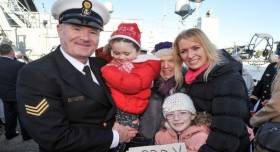Displaying items by tag: LE Samuel Beckett returns
#BeckettHome - In time for Christmas with an arrival home writes The Irish Examiner. Hugs, kisses, and a few tears of joy shed as the crew of the LÉ Samuel Beckett disembarked to be greeted by loved ones yesterday after 85 days on migrant rescue operations in the Mediterranean Sea.
However, many of the sailors will forever remember the horrors they witnessed off the coast of Libya, as merciless people-smugglers knowingly send migrants to a certain death if they’re not rescued.
Ship’s captain Lieutenant Commander Darragh Kirwan said he had no doubt the migrants crammed into inflatable rubber dinghies would never have made it to Italy.
On their first day of operations, six migrants drowned as the ship went to the rescue of a group packed into a dinghy.
“Around 25% of all inflatables we came across had punctured chambers. There isn’t enough food on board them and they are only given enough petrol for 50 miles. They [people smugglers] know they are sending people to their deaths,” the senior officer said.
To add to their woes, “jackals”, as the navy term them, often prey on the migrants at sea, stealing their outboard motors and personal valuables.
For much more on the Haulbowline homecoming click here
LÉ Samuel Beckett Returns Home On Completion of Humanitarian Deployment
#BeckettReturns - LÉ Samuel Becket (P61) has returned to Irish waters having completed her humanitarian role in search and rescue operations in the Mediterranean, writes Jehan Ashmore.
Commodore Hugh Tully, Flag Officer Commanding the Naval Service is to visit the crew of the leadship OPV90 class which arrived in Cork Harbour this morning.
It is understood her last port of call was Malaga, Spain having sailed from duties in the central Mediterranean where she was heavily involved in rescuing refugees from unseaworthy small craft off the coast of Libya.
LÉ Samuel Beckett is this morning to berth at Haulbowline Naval Base from where she departed on deployment in September. Onboard are a crew of 58 who were joined for the humanitarian mission by two medics from the Army and the Air Corps.
The Naval Service OPV successfully rescued 1,088 people over the course of five operations in co-operation with the Italian Maritime Rescue Co-Ordination Centre.
As previously reported, the Government may deploy another naval vessel in early 2016 to assist with the ongoing crisis.
























































